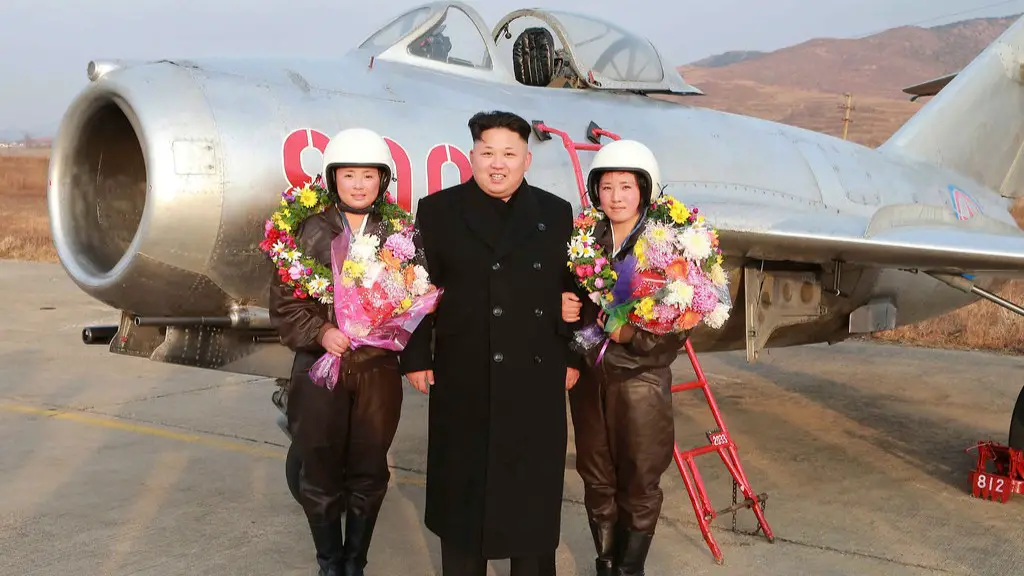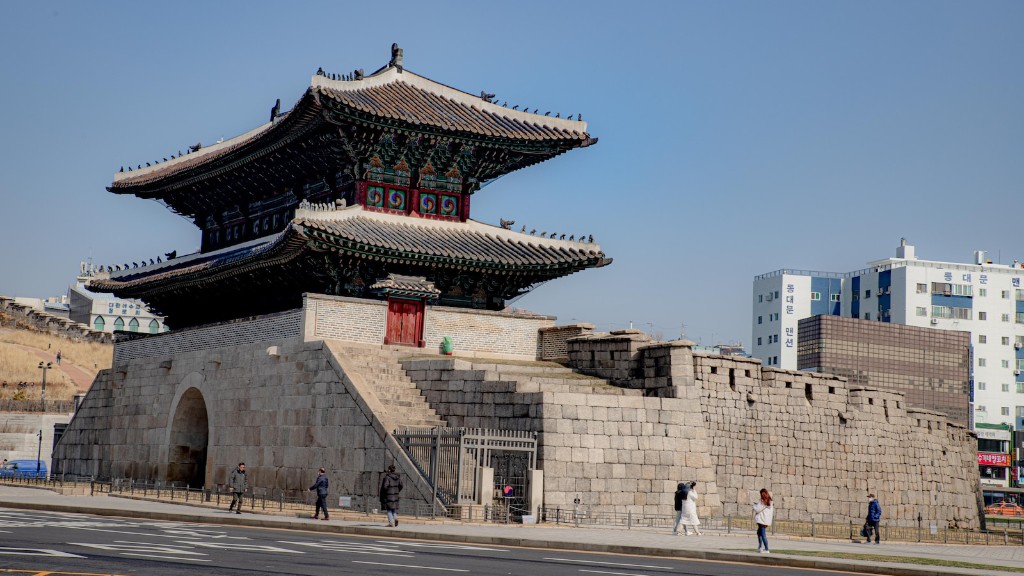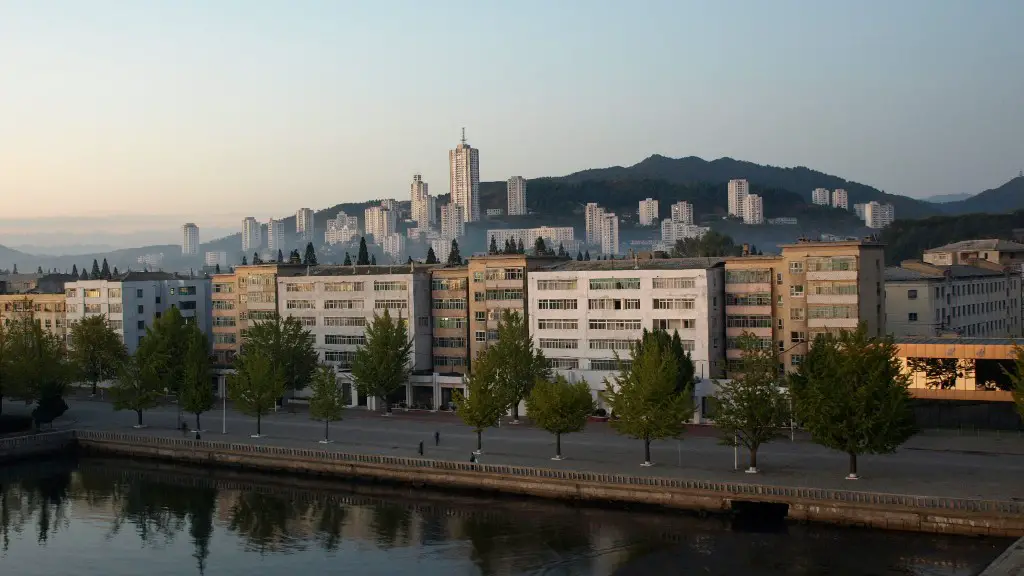Section 1: Nuclear Arms Presence
North Korea has been developing nuclear weapons for many years and this has caused global concern. In 2006, the country conducted its first nuclear test and since then, North Korea has conducted five more tests at irregular intervals. As of 2020, the estimated number of nuclear weapons in the country is 20-30. Over the years, a unique political situation in North Korea has spawned an environment of fear and insecurity which has driven the country to invest heavily in nuclear armaments. North Korea’s isolated position and its commercial and international relations with other countries are also considered to be key weapons in the country’s nuclear arsenal.
Section 2: Military Power
North Korea’s military prowess has been recognized by many countries, and the military has become a powerful tool for the country’s ruling elite. The nuclear reactors in North Korea are part of a tightly controlled infrastructure controlled by the military. This military infrastructure is reinforced through the use of nuclear weapons, which provide a powerful deterrence to aggression from both internal and external foes. North Korea’s military is also believed to have access to highly sophisticated weapons of mass destruction, as well as an advanced missile defense system.
Section 3: Insecurity & Isolation
The main threat posed by North Korea’s nuclear arsenal centers around its insecure hold over power. North Korea’s nuclear weapons are a powerful symbol of the country’s isolation and insecurity. The nuclear weapons symbolize North Korea’s belief that only a strong military will deter potential adversaries, and the regime will not hesitate to use them if threatened. North Korea’s nuclear weapons have a huge political impact, as they can be used to destabilize countries or regions in the event of an argument or a conflict.
Section 4: Unconventional Diplomacy
North Korea’s possession of nuclear weapons has been met with widespread international condemnation but without any real result. This has lead to the country’s adoption of unconventional diplomacy which involves its leadership making overtures for dialogue and negotiations with the US in an effort to normalize relations. In recent years, North Korean leaders have become more open to diplomatic solutions and have made some positive diplomatic steps such as the dismantling of a nuclear testing site. However, there has been little movement in terms of denuclearization.
Section 5: Conflict & Aggression
The US and its allies have imposed various economic sanctions against North Korea due to its refusal to abandon its nuclear program. The country’s aggressive stance on foreign policy is a major source of tension with both the US and South Korea. The North Korean leadership perceives its nuclear arsenal as a way to protect their sovereignty and to gain leverage in negotiations with other nations. Despite this, North Korea is vulnerable to military action by the US and its allies, who have vowed to ensure that North Korea’s nuclear weapons program is strictly monitored.
Section 6: Cultural & Geopolitical Leverage
North Korea’s nuclear weapons program is a major part of the country’s geopolitical and cultural stance. The North Korean regime is believed to view the country’s nuclear weapons as a tool to exert cultural and geopolitical leverage. North Korea’s possession of nuclear weapons is seen as a way to threaten its perceived enemies and extract concessions from them. In addition, North Korea’s possession of nuclear weapons is seen by many as a way for the country to achieve cultural and political dominance and elevate its status in the world.
Section 7: The Great Debate
The debate on North Korea’s nuclear weapons program remains heated. International opinion is divided over the issue, with some countries calling for North Korea to be allowed to pursue its nuclear program in a safe and responsible manner while other countries believe that North Korea should give up its nuclear weapons program entirely. North Korea’s nuclear weapons program has been further complicated by China’s involvement in the region, as the Chinese government has attempted to mediate and shape the debate in a way that is favorable to its own interests.
Section 8: International Sanctions
Given the increasing global threat that North Korea’s nuclear weapons program poses, the UN Security Council has imposed various sanctions against North Korea. These sanctions are primarily targeted at the country’s nuclear weapons program, with some sanctions aimed at punishing the country for its human rights abuses. Many countries have also implemented economic sanctions against North Korea, although these have had limited effect as North Korea’s leadership continues to invest heavily in its nuclear program.
Section 9: Domestic Reaction
Within North Korean society, the country’s possession of nuclear weapons is a source of immense pride. This sentiment is often bolstered by the North Korean government, which propagates the idea that North Korea’s nuclear weapons program proves the strength and superiority of the regime. Despite this, North Korea’s citizens are not allowed to participate in debates on the country’s nuclear weapons program and are forbidden to question the country’s nuclear ambitions.
Section 10: Uncertain Futures
The future of North Korea’s nuclear weapons program is uncertain, as the threats posed by it continue to proliferate. The international community remains divided over the issue, although some countries are gradually beginning to take a more lenient stance towards North Korea’s nuclear ambitions. However, North Korea’s nuclear weapons program remains a source of tension and could spiral out of control if not managed properly. The stakes are high and it is likely that North Korea’s nuclear weapons program will continue to be a major point of debate for some time to come.


